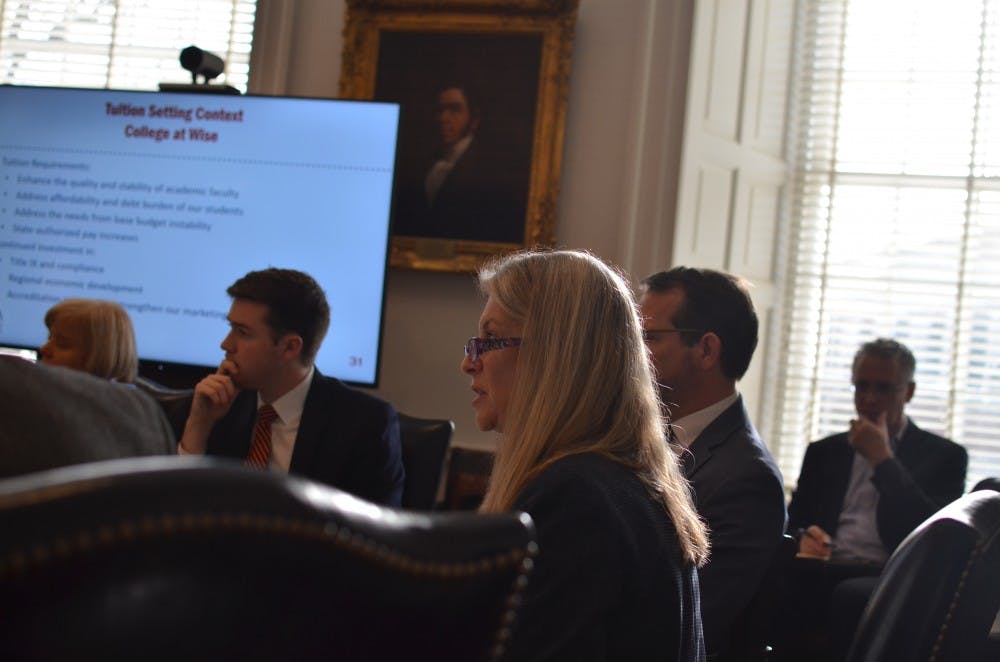The Finance Committee of U.Va.’s Board of Visitors approved increases to base tuition for in- and out-of-state undergraduate students in a meeting Friday in the Rotunda. In-state students will see a 2.9 percent increase in tuition and fees starting in the 2019-2020 academic year — from $13,682 to 14,078 — while out-of-state students will see a base increase of 3.5 percent, from $44,724 to $46,289.
The required auxiliary fee would increase by $120, or 5.2 percent, in the next academic year, and the committee also approved increases to dining and housing costs. Melody Bianchetto, the University’s vice president for finance, estimated that costs across the board would increase by around three percent — or approximately $973 for in-state College students and $1,925 for out-of-state College students.
University President Jim Ryan said the school has a policy of limiting annual tuition increases to one percent above inflation, though he said it would take 48 years for U.Va. to catch up to its peers’ tuition in the U.S. News & World Report’s top 25 highest-ranked private universities — institutions Ryan considers peers. He noted that he could not get reliable information about the two other public universities in the U.S. News & World Report’s top 25.
“Some of this conversation has to be about what kind of institution we want to be,” Ryan said. “Sometimes you hear people say, ‘We should be the best public university.’ Others say we should compete among publics and privates. Not to recognize that we’re at a competitive disadvantage would be a mistake.”
The combined increases — as well as increases to tuition for some graduate-level programs — would generate $13.3 million in additional annual revenue, according to the committee’s presentation documents. In 2017, the University’s financial report said the school brought in over $545 million in tuition and fees.
University Rector Frank M. Conner III said he believes the University must balance keeping its tuition affordable with staying competitive.
“Most of the people who are talking to us about affordability only have one piece of the equation in mind,” Conner said. “My personal view is that, if you focus solely on affordability, you’ll neither be affordable, nor great.”
Third-year College student Tanner Hirschfeld — who previously told The Cavalier Daily he planned to silently protest the committee’s vote — attended the meeting.
The committee discussed, but did not vote on, increases to upper-division tuition in the College of Arts and Sciences. If approved at the next meeting, tuition for third- and fourth-year College students would increase compared to first- and second-year students to finance more costly academic endeavors, like smaller class sizes.
In an interview prior to the meeting, Ryan told The Cavalier Daily he supports the upper-division tuition increases.
“No one likes to raise tuition, no one likes to have tuition raised,” Ryan said. “But the rationale for it is consistent with the rationale for differential tuition at Batten ... Architecture, Nursing, which is that those educational programs involve smaller classes and more intense educational experiences, which, frankly, are more expensive.”
In the meeting, Ryan reaffirmed his support for the differential tuition increase, adding that “the future of the College is at stake.”
College Dean Ian Baucom said the upper-division tuition increases would generate $10 million in new annual revenue to be used to decrease class sizes and create new programs and courses, especially in the hard sciences. Calculus and chemistry courses, in particular, will be reworked to include more interactive programming.
The upper-division tuition increases will be voted on in the committee’s March meeting.
The committee also approved increased housing and meal plan rates — an average of 3.5 percent increase to undergraduate housing fees and 2.44 percent to student dining fees, effective starting in the 2019-2020 academic year.
The housing rate hike, according to Colette Sheehy, U.Va.’s senior vice president for operations, will help finance projects like the McCormick Road renovations and dorm construction on Brandon Avenue.
Included in the meal plan rate increase is an additional meal plan option for students opting to eat on Grounds, with 120 meal swipes and $750 plus dollars allotted for the year. Formerly, students could purchase either 50, 80 or 160 meal swipes per semester in “block” meal plans.
The approved proposal also creates an optional “Corner Cash” add-on to all All Access and Semester block meal plans, which will be usable at non-University restaurants near Grounds.





